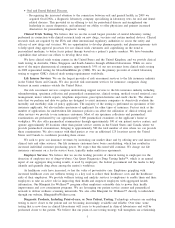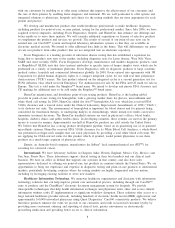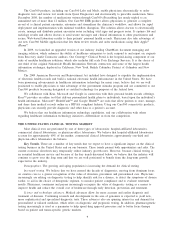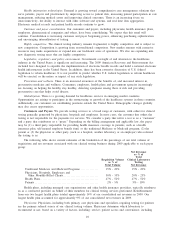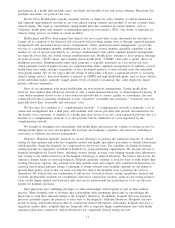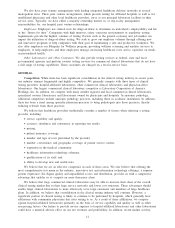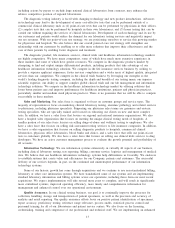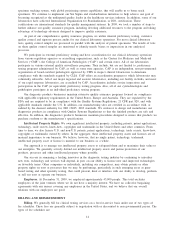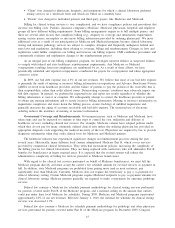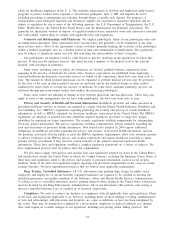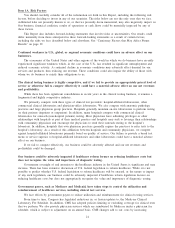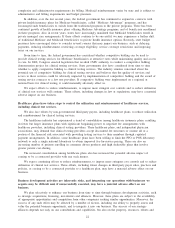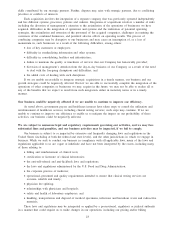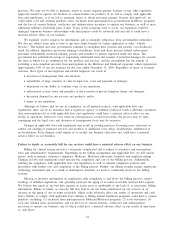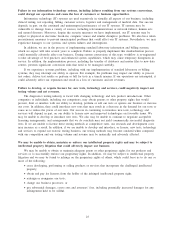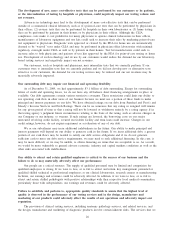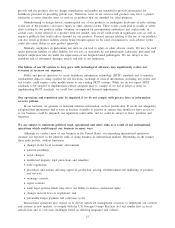Quest Diagnostics 2009 Annual Report Download - page 27
Download and view the complete annual report
Please find page 27 of the 2009 Quest Diagnostics annual report below. You can navigate through the pages in the report by either clicking on the pages listed below, or by using the keyword search tool below to find specific information within the annual report.CLIA does not preempt state laws that are more stringent than federal law. State laws may require additional
personnel qualifications, quality control, record maintenance and/or proficiency testing. State laws also may
require detailed review of our scientific validations and technical procedures for tests before approval for use or
marketing of services.
Fraud and Abuse Rules. Federal anti-kickback laws and regulations prohibit making payments or furnishing
other benefits to influence the referral of tests billed to Medicare, Medicaid or certain other federal or state
healthcare programs. The penalties for violation of these laws and regulations may include monetary fines,
criminal and civil penalties and/or suspension or exclusion from participation in Medicare, Medicaid and other
federal healthcare programs. Several states have similar laws.
In addition, federal and state anti-self-referral laws generally prohibit Medicare and Medicaid payments for
clinical tests referred by physicians who have a personal investment in, or a compensation arrangement with, the
testing laboratory. Some states also have laws that are not limited to Medicare and Medicaid referrals and could
also affect investment and compensation arrangements with physicians.
FDA. The FDA has regulatory responsibility over, among other areas, instruments, test kits, reagents and
other devices used by clinical laboratories to perform diagnostic testing in the United States. The FDA also
regulates clinical trials (and, therefore, testing that we perform for sponsors of those trials), drugs-of-abuse testing
for employers, testing for blood bank purposes and testing of donors of human cells for purposes such as in vitro
fertilization. A number of esoteric tests we develop internally are first offered as laboratory-developed tests
(“LDTs”). The FDA has claimed regulatory authority over all LDTs, but has exercised enforcement discretion
with regard to most LDTs performed by high complexity CLIA-certified laboratories. However, the FDA has
been petitioned to exercise regulatory authority over certain LDTs and to initiate enforcement action against
companies that make effectiveness claims about LDTs that are without sufficient analytical and clinical support.
In addition, the FDA has issued two drafts of a guidance document describing certain LDTs it refers to as “In
Vitro Diagnostic Multivariate Index Assays.” The FDA could finalize this guidance document, clarifying its
intention to regulate these tests as medical devices and the laboratories that offer this subset of LDTs. If FDA
regulation of this subset of LDTs occurs or if increased regulation of the various medical devices used in
laboratory-developed testing ensues, it would lead to an increased regulatory burden resulting in additional costs
and delays in introducing new tests, including genetic tests; this may hinder us from developing and marketing
certain new products or services.
In September 2007, the FDA finalized its guidance relating to analyte specific reagents (“ASRs”), which
laboratories use in LDTs. As a result, manufacturers of certain products previously marketed as ASRs must file
for FDA clearance of these products in order to market them in the United States. Failure to act diligently and to
cooperate with the FDA may result in enforcement action against the manufacturer. The increased regulation of
these products could result in increased product cost, a delay in obtaining them or, if a manufacturer withdraws
its products from the market, an inability to obtain the product. These factors may hinder our ability to develop
and market new products or services or cause an increase in the cost of our products or services.
Our diagnostic product business is subject to regulation by the FDA, as well as by foreign governmental
agencies, including countries within the European Union who have adopted the Directive on In Vitro Diagnostic
Medical Devices (“IVDD”). These agencies enforce laws and regulations that govern the development, testing,
manufacturing, labeling, advertising, marketing, distribution and post-market surveillance of diagnostic products.
Prior to commercially marketing or selling most diagnostic products in the U. S. we are required to secure
clearance or approval from the FDA. Similarly, we may need to obtain a license or certification such as a CE
mark in order to sell diagnostic products outside of the U. S. Compliance with the IVDD allows us to market in
Europe once we obtain a CE mark (obtainable where the manufacturer certifies that the device conforms to the
regulatory and quality requirements for the device). Following the introduction of a diagnostic product into the
market, the FDA and non-U.S. agencies engage in periodic inspections and reviews of the manufacturing
processes and product performance. Compliance with these regulatory controls can affect the time and cost
associated with the development, introduction and continued availability of new products. These agencies possess
the authority to take various administrative and legal actions against us for non-compliance, such as fines,
product suspensions, submission of warning letters, recalls, product seizures, injunctions and other civil and
criminal sanctions. Where appropriate, voluntary compliance actions, such as voluntary recalls, may be
undertaken.
Environmental, Health and Safety. We are subject to laws and regulations related to the protection of the
environment, the health and safety of employees and the handling, transportation and disposal of medical
specimens, infectious and hazardous waste and radioactive materials. For example, the U.S. Occupational Safety
and Health Administration (“OSHA”) has established extensive requirements relating specifically to workplace
17


